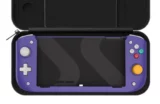‘Are emulators illegal or not?’ Nintendo lawyer explains why it’s been taking them down
Nintendo has been actively attempting to shut down emulators in recent years

A senior lawyer at Nintendo has given an explanation of what makes an emulator illegal, particularly when it comes to more recent releases.
As reported by Denfaminicogamer, a recent lecture hosted by Japan’s Association of Copyright for Computer Software was attended by Nintendo‘s patent attorney and IP department general manager Koji Nishiura.
While the lecture – which also included contributions from IP executives at Sega, Capcom and Konami among others – focused on a number of topics, one of these was the issue of emulation.
Nishiura explained that while emulators themselves aren’t illegal by definition, they can become illegal if they operate in a way that infringes on a company’s rights.
“To begin with, are emulators illegal or not?” Nishiura asked (as translated by Automaton). “This is a point often debated. While you can’t immediately claim that an emulator is illegal in itself, it can become illegal depending on how it’s used.”
He went on to explain that while an emulator that imitates a game device may be legal on paper, if the emulator also copies a program belonging to that device, that can constitute copyright infringement.
Nishiura added that if the emulator also disables security measures like encryption, that could also be considered illegal. He said this counts for other methods such as flash carts, citing the use of Nintendo DS flash carts (such as the R4) which bypassed security by imitating a legitimate DS game.
He pointed out that Nintendo and more than 50 other software manufacturers filed a joint lawsuit against sellers of flash carts, and won a ruling that they were in violation of Japan’s Unfair Competition Prevention Act.

In another example of what makes emulators illegal, Nishiura noted that if an emulator links users to resources where pirated games can be downloaded, this is also considered copyright infringement.
In 2024 Nintendo took down two notable Switch emulators as part of a wider effort to combat unauthorised access to its games.
Switch emulator Yuzu was taken down in May after Nintendo issued a DMCA notice to GitHub, resulting in the removal of more than 8,500 repositories containing versions of the emulator.
This was followed in October by a takedown of Switch emulator Ryujinx, which was shut down by its lead developer after they were approached by Nintendo.

















